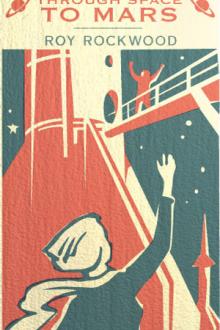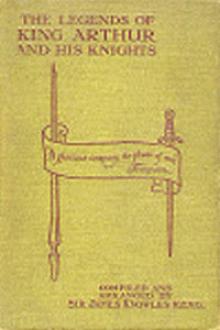Lost on the Moon by Roy Rockwood (best fiction novels .txt) 📕

- Author: Roy Rockwood
- Performer: -
Book online «Lost on the Moon by Roy Rockwood (best fiction novels .txt) 📕». Author Roy Rockwood
and a man on the moon could jump six times as high as he can on this
earth, and throw a stone six times as far.”
“What’s dat?” inquired Washington White quickly, nearly dropping some
packages he was carrying into the projectile. “What was yo’ pleased t’
saggasiate, in remarkin’ concernin’ de untranquility ob the densityness
ob stones jumpin’ ober a man what is six times high?” he asked.
“Do you mean what did I say?” asked Mark solemnly.
“Dat’s what I done asked yo’,” spoke the colored man gravely.
“Well, you didn’t, but perhaps you meant to,” went on the youth, and he
repeated his remarks.
“‘Scuse me, I guess I’d better not go on dish yeah trip after all,”
came from Washington.
“Why not?” demanded Professor Henderson.
“‘Cause I ain’t goin’ t’ no place whar ef yo’ wants t’ take a little
jump yo’ has t’ go six times as far as yo’ does when yo’ is on dis yeah
earth. An’ s’posin’ some ob dem moon men takes a notion t’ throw a
stone at me? Whar’ll I be, when a stone goes six times as far as it
does on heah? No, sah, I ain’t goin’!”
“But perhaps there are no men on the moon,” said Mark quickly. “It is
only a theory of astronomers that I’m talking about.”
“Oh, only a theory; eh?” asked Washington quickly.
“That’s all.”
“Oh, if it’s only a theory, den I reckons it’s all right,” came from
the colored man. “I didn’t know it were a theory. Dat makes it all
right. It’s jest in theory, am it, Massa Mark, dat a stone goes six
times as far?”
“That’s all.”
“Oh, well, den, why didn’t yo’ say so fust, dat it was only a theory? I
don’t mind theories. I—I used t’ eat ‘em boiled an’ roasted befo’ de
wah.” And, with a contented smile on his face, Washington went into the
projectile, to finish stowing things away in his kitchen lockers.
The big projectile was housed in the shed where it had been
constructed, and the professor and the boys were working over it there,
carefully guarded from curious eyes, for the German inventor did not
want the secret of his Cardite motor to become known.
The work went on from day to day, good progress being made. The boys
were of great assistance, for they were practical mechanics, and had
had considerable experience.
“Well, I shall try the Cardite motor to-morrow,” announced Professor
Roumann one night, after a hard day’s work on the projectile.
“Do you think it will work?” asked Mr. Henderson.
“I think so, yes. My experiments have made me hopeful.”
“And if it does work, when can we start?” asked Jack.
“Two days later; that is, if everything else is in readiness, the food
and other, supplies on board.”
“They are all ready to be stowed away,” said Andy Sudds, who had been
hunting all day.
It was an anxious assemblage that gathered inside the big shed the next
day, to watch Professor Roumann try the Cardite motor. Would it work as
well as had the Etherium one? Would it send them along through space at
enormous speed? True, they would not have to travel so far, nor so
fast, but more power would be needed, since, as it was feared no food,
water, nor air could be had on the moon, many more supplies were to be
taken along than on the trip to Mars, and this made the projectile
heavier.
“We will test the Cardite in this small motor first,” said Mr. Roumann,
as he pointed to a machine in the projectile used for winding a cable
around a windlass when there was necessity for hauling the Annihilator
about, without sending it into the air.
Into the receptacle of the motor, the German professor placed some of
the wonderful red substance he had secured from Mars. Then he closed
the heavy metal box that held it, and, looking about to see if all was
in readiness, he motioned to those watching him that he was about to
shift the lever that would start the motor.
“If it works as well as I hope it will,” he said, “it ought to pull the
projectile slowly across the shop—a task that would be impossible in a
motor of this size, if operated by electricity, gasoline, or any other
force at present in use. And, if this small motor will do that, I know
the large ones will send us through space to the moon. All ready, now.”
Slowly the professor shoved over the lever, while Jack, Mark and the
others watched him carefully. They were standing back of him, in the
engine room of the projectile.
There was a clicking sound as the lever snapped into place. This was
succeeded by a buzzing hum, as the motor began to absorb the great
power from the red substance, which was not unlike radium in its
action. There was a trembling to the great projectile.
“She’s moving!” cried Jack.
Hardly had he spoken when there was a flash of red fire, a sound as of
a bursting bomb, and everyone was knocked from his feet, over backward,
while Professor Roumann was hurled the entire length of the engine
room.
“The Cardite motor has exploded!” cried Mark. “Professor Roumann is
killed!”
THE WORK OF AN ENEMY
Jack’s first act, on arising from amid a mass of tools, into which he
had been tossed by the explosion, was to run to where Professor Roumann
lay in a semi-conscious condition. An instant later Mark slowly arose,
and made his way to where Professor Henderson was rubbing his forehead
in a dazed fashion.
“Are you hurt?” asked Mark, of his aged friend.
“I think not,” answered Mr. Henderson slowly, “but I fear Mr. Roumann
is. See to him; I’m all right.”
“He’s breathing,” cried Jack, who had bent over the German. “He isn’t
dead, at any rate.”
“But he may be, unless he gets attention,” said Professor Henderson.
“Get my medicine chest, Mark, and we’ll see what we can do for him.”
Jack had raised the head of the injured man on his arm, and was giving
him some water from a glass. This partially revived the German, and he
opened his eyes. He looked around, into the faces of his friends, as if
scarcely comprehending what had happened, and then, as his gaze
wandered toward the disabled Cardite motor, he exclaimed:
“Some enemy has done this! The motor was tampered with. The resistance
block was loosened, and that caused the force of the Cardite to shoot
out at the rear. We must watch out for the work of this enemy!”
“Don’t distress yourself about that now,” urged Mr. Henderson. “Are you
badly hurt? Do you need a doctor?”
The German slowly drank the rest of the water which Jack gave him, and
then gradually arose to a standing position.
“I am all right,” he said faintly, “except that I feel a trifle dizzy.
Something hit me on the head, and the fumes from the Cardite took away
my breath for a moment. I think I shall be all right soon.”
“Here is the medicine chest!” exclaimed Mark, coming back into the
engine room. Mr. Henderson poured out some aromatic spirits of ammonia
into a graduated glass, added a little water, and gave it to his
fellow, inventor, who, after drinking it, declared that he felt much
better. There was a cut on his forehead, where a piece of the broken
motor had struck him, but, otherwise, he did not seem injured
externally.
As for the boys, they were only stunned, nor was Mr. Henderson more
than momentarily shocked. In a few minutes the German professor was
almost himself again.
“We must try to discover who our enemy is,” he said earnestly, as he
looked over the disabled motor. “He might have blown up the whole
projectile by tampering as he did with the machinery. Had I been
testing the large, instead of the small motor, there would have been
nothing left of the Annihilator, or us, either. Who could have done
this? If that crazy machinist is around again–-”
“I don’t believe he could get here from Mars,” interrupted Jack, with a
smile.
“Hardly,” added Mark.
“No, I guess he is still on the Red Planet, so it couldn’t have been
him,” went on Mr. Roumann. “But it was some one.”
Jack and Mark at once thought of the odd man who had sent Mark the
note, and then had run away.
“Could it have been him?” suggested Jack.
“It’s possible,” remarked Professor Henderson. “We must be on our
guard. I wonder if Washington–-”
At that moment there sounded a violent pounding on the exterior of the
projectile, and the voice of the colored man could be heard calling:
“Am anything de mattah? Andy Sudds an’ I is out heah, an’ we heard
suffin goin’ on in dere. Am anybody hurted?”
“It’s all over now, Wash,” replied Jack, for the two boys, and the two
professors, had shut themselves up in the projectile while they
conducted the experiment. Jack opened the door of the Annihilator
and stepped out, being met by the colored man and the old hunter.
“You haven’t seen any suspicious characters around, have you, Wash?”
asked Mark. “Some one has been tampering with a motor, and it
exploded.”
“Nobody’s been around since I’ve been here,” announced Andy Sudds, with
a significant glance at his gun.
“Maybe it’s some ob dem moon-men, what don’t laik de idea ob us goin’
dere arter dere diamonds,” volunteered the colored man.
“Perhaps,” admitted Jack, with a smile. “But certainly some one has
been around here who had no business to be, and we must find out who it
was. Better take a look around, Wash.”
“I’ll help him,” said Andy, and, with his rifle in readiness for any
intruders, the old hunter followed the colored man outside the big
shed.
Meanwhile Professor Roumann and Mr. Henderson were carefully examining
the exploded motor.
“I should have looked at the breech plug before turning on the power,”
said the German, “but I had no reason to suspect that anything was
wrong.” He went on to explain that the explosion was something like
that which occurs when the breech-block of a big navy gun is not
properly in place. The force of the Cardite, instead of being directed
against the piston-heads of the motor, shot out backward, and almost
into the face of the professor, who was operating the machine.
“But what could be their object?” asked Mark. “Who would want to injure
us, or damage the projectile?”
“Some enemy, of course,” declared Jack. “But who? The crazy machinist
is out of it, and as for that man who sent the note to you, he seemed
too big a coward to attempt anything like this.”
“Some one evidently sneaked in here and loosened the breech-plug,” went
on Mark, “and it was evidently done with the idea of delaying us. The
enemy could not have desired to utterly disable the projectile, or else
he would have tampered with the large motor, instead of the small one.”
“Yes, the object seems to have been to delay us,” admitted Professor
Henderson; “yet, I can’t understand why. Whoever did it evidently knows
something about machinery.”
“I hope they did not discover the secret of my Cardite motor,” said
Professor Roumann quickly.
“They hardly had time,” declared Mark. “We have been in or





Comments (0)